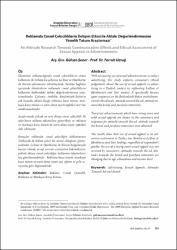| dc.contributor.author | Şener, Gülcan | |
| dc.contributor.author | Uztuğ, Ferruh | |
| dc.date.accessioned | 2019-10-22T20:07:14Z | |
| dc.date.available | 2019-10-22T20:07:14Z | |
| dc.date.issued | 2012 | |
| dc.identifier.issn | 1303-0876 | |
| dc.identifier.uri | http://www.trdizin.gov.tr/publication/paper/detail/TVRNNU56QTRPQT09 | |
| dc.identifier.uri | https://hdl.handle.net/11421/22263 | |
| dc.description.abstract | Günümüz reklamcılığında cinsel çekiciliklerin artan kullanımı ile birlikte bu çalışma, LaTour ve Henthorne ile Tai’nin çalışmasını tekrarlayarak, Türkiye bağlamı içerisinde tüketicilerin reklamda cinsel çekiciliklerin kullanımı hakkındaki ahlaki değerlendirmesini araştırmaktadır. Çalışma, özellikle, Reidenbach-Robin’in çok boyutlu ahlaki ölçeği, reklama karşı tutum, markaya karşı tutum ve satın alma niyeti tepkileri üzerine odaklanmaktadır. Araştırmada yüksek ve orta düzey cinsel çekicilikli iki adet basın reklamı tüketicilere gösterilmiş ve reklama ve markaya karşı tutum ile satın alma niyeti tepkileri elde edilmiştir. Sonuçlar reklamda cinsel çekiciliğin kullanımının Türkiye’de de dikkat çekici bir unsur olduğunu göstermektedir. LaTour & Henthorne ile Tai’nin bulgularıyla benzer olarak, cevap verenin cinsiyetine bakmaksızın, yüksek düzey cinsel çekiciliğin kullanımı tüketicilerce hoş görülmemektedir. Reklama karşı tutum, markaya karşı tutum ve satın alma niyeti yaş, eğitim ve gelir seviyesine göre değişmektedir. | en_US |
| dc.description.abstract | With increasing use of sexual advertisements in today's advertising, this study explores consumer's ethical judgements about the use of sexual appeals in advertising in a Turkish context by replicating LaTour & Henthorne's and Tai's studies. It specifically focuses upon responses on the Reidenbach-Robin multidimensional ethical scale, attitude toward the ad, attitude toward the brand and purchase intensions. Two print advertisements which have strong overt and mild sexual appeals are shown to the consumers and responses for attitude towards the ad, attitude towards the brand and purchase intensions were obtained. The results show that use of sexual appeal is an attractive instrument in Turkey, too. Similar to LaTour & Henthorne and Tai's findings, regardless of respondent's gender, the use of a strong overt sexual appeal was not received by consumers. Attitudes towards the ad, attitudes towards the brand and purchase intensions are changing due to age, eduacation and income level. | en_US |
| dc.language.iso | tur | en_US |
| dc.rights | info:eu-repo/semantics/openAccess | en_US |
| dc.subject | Sosyal Bilimler | en_US |
| dc.subject | Disiplinler Arası | en_US |
| dc.title | Reklamda cinsel çekiciliklerin iletişim etkisi ile ahlaki değerlendirmesine yönelik tutum araştırması | en_US |
| dc.title.alternative | An attitude research towards communication effects and ethical assessment of sexual appeals in advertisements | en_US |
| dc.type | article | en_US |
| dc.relation.journal | Anadolu Üniversitesi Sosyal Bilimler Dergisi | en_US |
| dc.contributor.department | Anadolu Üniversitesi, Sosyal Bilimler Enstitüsü | en_US |
| dc.identifier.volume | 12 | en_US |
| dc.identifier.issue | 3 | en_US |
| dc.identifier.startpage | 153 | en_US |
| dc.identifier.endpage | 168 | en_US |
| dc.relation.publicationcategory | Makale - Ulusal Hakemli Dergi - Kurum Öğretim Elemanı | en_US] |


















